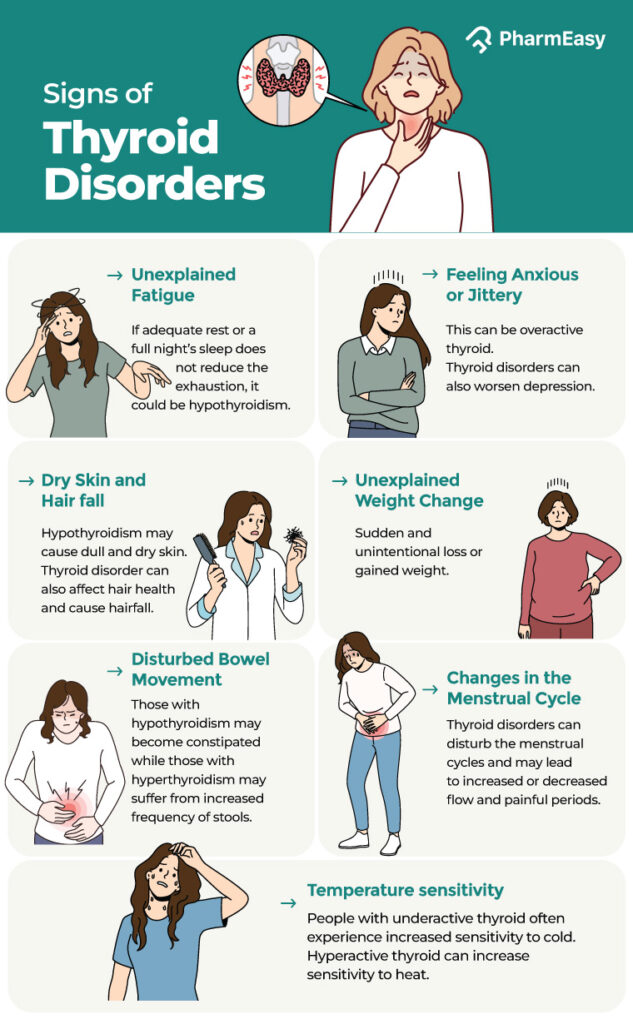11 Proven Signs And Symptoms Of Thyroid Issues
By Dr. Nikita Toshi +2 more

Get,

to manage your symptom
Get your,


4 Cr+ families
benefitted

OTP sent to 9988776655



You’ve successfully subscribed to receive
doctor-approved tips on
Whatsapp

Get ready to feel your best.

Hi There,
Download the PharmEasy App now!!


Register to Avail the Offer
Send OTPBy continuing, you agree with our Privacy Policy and Terms and Conditions

Hi There,
Sign up on PharmEasy now!!
Trusted by 4 crore+ families

OTP sent to 9988776655



You have unlocked 25% off on medicines




Code: NU25
By Dr. Nikita Toshi +2 more
Table of Contents
The thyroid gland is one of the most important glands of the body. It is responsible for releasing those hormones in the body that maintain the body’s metabolism. It is located in the neck, just under Adam’s apple. Genetic factors and a wrong lifestyle can lead to under or overworking of the thyroid gland. Let us take a look at some of the signs of thyroid issues in females.

One of the surest signs of thyroid problems is sudden weight gain. We are talking something like a ten kgs increase in weight in a span of two to three months. A sluggish thyroid gland reduces the body’s capacity to metabolize fat and hence leads to worrisome weight gain.

Women who have imbalanced thyroid hormone levels suffer from high cholesterol. Since thyroid hormones are responsible for metabolism, an imbalance wreaks havoc on heart health due to high cholesterol levels.
Read More: How to Reduce Cholesterol Level?
Those who have a thyroid gland functioning below normal will find the weather colder than it is. Those ladies who have an overactive thyroid will feel hotter than others because of more heat generation in the body.
An underactive thyroid gland is responsible for retaining fluid in the body and leading to bloating. Fluid retention is a sure sign of thyroid disease.
Acute thyroid issues, whether hyperthyroidism or hypothyroidism, can result in hair loss to varying degrees. This symptom is not one you’ll see in the early stages, but prolonged and untreated thyroid problems can result in severe loss of hair.
Patients with thyroid disorders often continue taking their initial prescribed dose for years without regular follow-up. It’s crucial to realize that even in the absence of new symptoms, patients should undergo thyroid level testing and medication dosage adjustments every six months.
Dr. Arpit Verma, MBBS, MD (Pharmacology)
Racing heartbeats or palpitations are a symptom of the functioning of an imbalanced thyroid gland. This is because elevated thyroid hormones tend to make the body go into an overdrive mode leading to stressing the heart and increasing the heartbeats.
Women who suffer from improper functioning of the thyroid gland either have excessive and prolonged or scanty menstrual flow. This is one of the important symptoms of thyroid in women.
Muscular pains form an important part of thyroid malfunctioning. These are due to the intense muscular fatigue that wonky thyroid hormones can cause.
High levels or low levels of thyroid hormones are a significant drawback. They can leave the person feeling sluggish with poor concentration. If left untreated over a period, they can even cause feelings of depression.
Like thyroid screeing is mandatory in newborn babies , similarly it’s better for all people to get a thyroid function test yearly.
Dr. M.G. Kartheeka, MBBS, MD(Pediatrics)
An overactive thyroid gland can lead to nervousness and tremors in the person suffering from it. This is something of a whiplash effect because of elevated hormone levels.
When the thyroid gland is not functioning optimally, the person suffers from changed stool patterns. Those who suffer from hypothyroidism usually have constipation, and those who have hyperthyroidism suffer from loose stools.
Since the thyroid gland is responsible for brain activity and metabolism, sleep patterns change considerably when there is an imbalance in thyroid hormones. Insomnia or too much sluggishness even after restful sleep should trigger your concern.
There may be a situation where your thyroid gland might release huge amounts of thyroid in a short span of time and is a medical emergency, be vigilant if you feel any symptoms associated with this condition.
Dr. Ashish Bajaj, M.B.B.S., M.D. in Clinical Pharmacology and Toxicology
Please note that not all symptoms will be present if you have a thyroid condition. If you have tick marked four to five of these symptoms, consult your doctor and get a blood test done to figure out the problem. It may be the case that you have some of these symptoms, but you also have other issues not mentioned here. In most cases, these signs are just warning signals that something is wrong. The only way to be sure is to go for a diagnostic test and get a doctor to make an accurate diagnosis.
Primarily, the TSH (thyroid Stimulating Hormone) test is most commonly used to determine the level your thyroid gland is functioning at. Additionally, there are also the T4 and T3 tests, which can further help to understand whether you have an overactive or underperforming thyroid. Lastly, if your doctor suspects that you may have Graves or Hashimoto’s disease, you may need to take a thyroid antibody test.
Also Read: 8 Best Food For Thyroid
Women are much more likely to be diagnosed with thyroid-related issues than men, and it is more common in women after menopause. So it is important to watch out for any symptoms of thyroid in females. Additionally, if you have a family history of thyroid problems or you are on medications that have a high iodine content, or you are a woman over 60 years of age, in all these cases your risk of thyroid issues is higher than others. Get yourself tested to avoid the onset of any new disease and catch any problems early.
Thyroid treatment can be done only if it is properly diagnosed first. Diagnosing the thyroid can be tricky as its symptoms can overlap with symptoms of other medical conditions. However, with the help of blood tests, imaging tests or physical exams, thyroid disease can be tested.
It is the goal of your doctor to help your thyroid gland go back to its normal state with the help of medications. If you have high levels of thyroid hormone (hyperthyroidism) in your blood, treatment options could be the following:
If you have a low level of thyroid in your blood system (hypothyroidism), thyroid replacement medications can be used. These synthetic (man-made) medications help add thyroid hormones back to your body. A common thyroid-replacement medicine that is often prescribed by doctors is levothyroxine.
In conclusion, the thyroid gland plays a crucial role in regulating metabolism and overall bodily functions. Identifying the signs and symptoms of thyroid issues is essential for timely diagnosis and appropriate treatment. From weight fluctuations and menstrual irregularities to palpitations and altered bowel movements, these indicators offer valuable insights into thyroid health. Consulting a medical professional and undergoing tests such as the TSH, T4 and T3 tests can help determine the extent of thyroid dysfunction. Remember, early intervention is key to managing thyroid disorders effectively. Whether it’s hyperthyroidism or hypothyroidism, a tailored treatment plan, including medications, antithyroid drugs, radioactive iodine or surgery, can restore thyroid balance and enhance overall well-being. If you suspect thyroid issues based on these symptoms, don’t hesitate to seek medical advice and take proactive steps to ensure your thyroid health.

Disclaimer: The information provided here is for educational/awareness purposes only and is not intended to be a substitute for medical treatment by a healthcare professional and should not be relied upon to diagnose or treat any medical condition. The reader should consult a registered medical practitioner to determine the appropriateness of the information and before consuming any medication. PharmEasy does not provide any guarantee or warranty (express or implied) regarding the accuracy, adequacy, completeness, legality, reliability or usefulness of the information; and disclaims any liability arising thereof.
Links and product recommendations in the information provided here are advertisements of third-party products available on the website. PharmEasy does not make any representation on the accuracy or suitability of such products/services. Advertisements do not influence the editorial decisions or content. The information in this blog is subject to change without notice. The authors and administrators reserve the right to modify, add, or remove content without notification. It is your responsibility to review this disclaimer regularly for any changes.

Leave your comment...
Comments